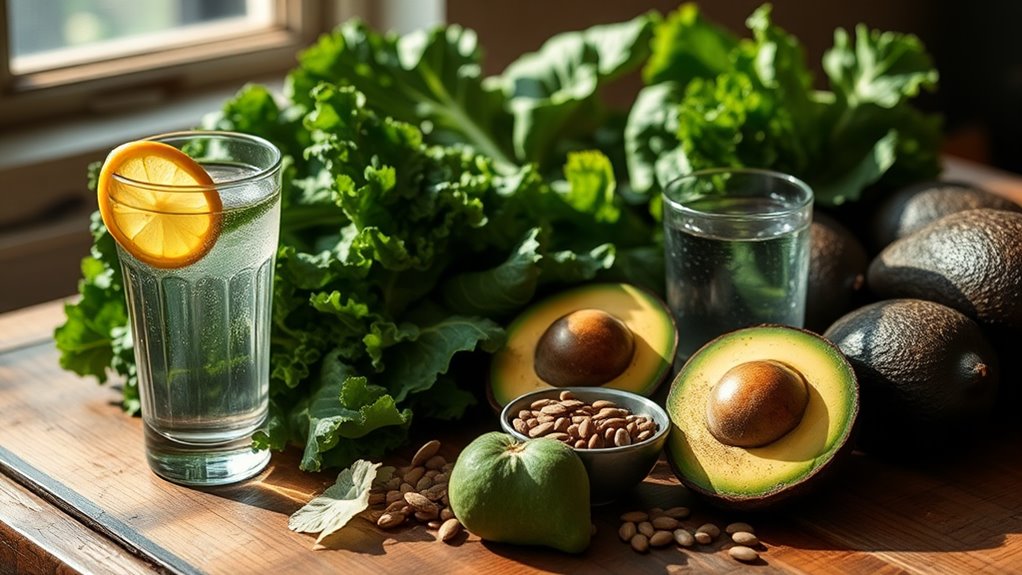The Most Overlooked Nutrient Women Need After 30
Calcium is often the most overlooked nutrient women need after 30. Your body starts to lose bone density, increasing the risk of osteoporosis. Consuming enough calcium supports bone health, muscle function, and even blood pressure regulation. Aim for 1,000 mg daily if you’re between 30 and 50, rising to 1,200 mg after 50. Dairy products, leafy greens, and fortified foods are great sources. Understanding your nutritional needs can make a significant difference in your health journey. There’s much more to explore on this topic.
Understanding the Nutrient Gap in Women Over 30
As you enter your 30s, your body undergoes various changes that can impact your nutritional needs. One important nutrient for women 30 and older is calcium.
Your bone density starts to decline, making adequate calcium essential for maintaining strength. Additionally, vitamin D plays a key role in calcium absorption. Incorporating foods rich in leafy greens can further enhance your overall health and support your body’s nutritional needs.
Addressing these gaps can help ensure you stay healthy and active.
Key Benefits of Incorporating This Nutrient
Incorporating calcium into your diet after 30 not only supports bone health but also contributes to overall well-being. Adequate calcium intake helps prevent osteoporosis, minimizes the risk of fractures, and supports muscle function. It also plays a role in cardiovascular health by assisting with blood pressure regulation. Additionally, less than 20% of consumed calcium is absorbed, highlighting the importance of adequate intake from dietary sources or supplements.
Food Sources Rich in This Nutrient
To maintain strong bones and overall health after 30, it’s vital to include foods rich in calcium in your diet.
Consider dairy products like yogurt and cheese, leafy greens like kale and spinach, and fortified foods such as almond milk or orange juice.
Other great sources include tofu and sardines.
Incorporating these foods can help ensure you’re meeting your calcium needs effectively. Additionally, focusing on nutritional value in your overall diet can significantly enhance your bone health and protect against related ailments.
Recommended Daily Intake for Optimal Health
While focusing on calcium intake is crucial for maintaining bone health after 30, understanding the recommended daily allowance (RDA) is just as important.
For women aged 30 to 50, the RDA is 1,000 mg. After 50, this increases to 1,200 mg.
Meeting these guidelines supports not only bone strength but also overall health, reducing the risk of osteoporosis in later years.
Tips for Incorporating This Nutrient Into Your Diet
Incorporating this essential nutrient into your diet can be easy and enjoyable.
Consider adding food sources like leafy greens, nuts, and whole grains to your meals, or try simple recipes that highlight these ingredients. Incorporating antioxidant-rich foods can further enhance your skin’s clarity and vitality. With a bit of creativity, you can enhance both flavor and nutrition in your daily routine.
Food Sources to Try
As you navigate the dietary changes that come with age, it’s essential to include specific nutrient-rich foods that support your health.
Consider incorporating leafy greens like spinach and kale, fatty fish such as salmon, legumes like lentils and chickpeas, and nuts for healthy fats.
Whole grains, including quinoa and brown rice, also provide essential nutrients that can enhance your overall well-being.
Easy Recipe Ideas
Eating well doesn’t have to be complicated, especially when it comes to boosting important nutrients after 30.
Try smoothies with spinach and yogurt, or a quinoa salad with black beans and avocado. For snacks, enjoy nuts or a fruit and nut mix.
Incorporate these easy recipes throughout your week to ensure you’re getting the nutrients you need without the hassle.
Potential Deficiency Symptoms to Watch For
While many women over 30 focus on maintaining a balanced diet, it’s easy to overlook the signs of potential nutrient deficiencies.
Watch for symptoms like fatigue, brittle hair, mood swings, and frequent illness. These may indicate a lack of essential vitamins and minerals, such as vitamin D, B12, or iron. Recognizing these nutritional deficiencies early can help you make necessary dietary adjustments for better health.

